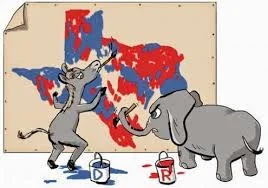The Impact of Duopoly (Part 2): Alternatives
/As I pointed out in part I, the United States is divided to the point where it is having a negative impact on our overall health. It is choking us, figuratively speaking, but what can be done to loosen its grip? Believe it or not, there are a few tactics that are already being put into place, and there are others that might help.
Open Primaries
Before considering how nonpartisan, single-ballot primaries could make a vast difference, it’s important to first understand how closed primaries work. Most states in the US have two primaries, where those registered as Democrats vote in their Democratic primaries and registered Republicans vote in theirs, respectively. This ensures that one Republican and one Democrat are selected for voting day. If you are registered as unaffiliated or third party, you are unable to vote either the Democratic or Republican primaries.
Open primaries are open to all registered voters and include all candidates on the ballot. In these kinds of primaries, the top two (or three or four) candidates with the most votes win and go on the official ballot, no matter their party affiliation. In this kind of primary, most or all of the top picks could come from the same party. In an open primary, it would be advantageous for running candidates to appeal to everyone, not just to those in their affiliated camp.
Ranked-Choice Voting (RCV)
Another possible solution is ranked-choice voting. In RCV, people don’t just vote for their top pick, they vote for their first choice, then second, and so on. Thus, their votes are rank-based. The state of Maine just recently implemented Ranked-Choice Voting (RCV) and used the for the first time in the 2016 midterm elections.
All of the ballots get counted, and if no single candidate gets over 50% of the votes, the lowest-scoring candidate gets dropped from the race and all the ballots that had the lowest scoring candidate as their top pick get re-counted with their second choice. The process continues until a candidate officially gets over 50% and is declared the winner.
This can be a difficult process to understand, especially when reading it. If you prefer a visual example to help make better sense of it, I’d recommend checking out this video:
Ending Gerrymandering
When states are determining how to separate their districts which are each represented by a Congressperson, there aren’t any rules by which they have to play. What often ends up happening is a practice called gerrymandering, in which a district is drawn in a manner so that it is primarily filled with a specific demographic of voters. A district can be either mainly Democratic or mainly Republican, that way they know how the district is going to vote.
When this happens, the district is drawn to a form that represents a Rorschach inkblot or a piece of interpretive art. In the cases of gerrymandered districts, it is as if the elected officials choose the people they represent rather than the reverse. This is where a process called nonpartisan redistricting could come into play.
Creating and passing legislation that puts rules and structure to how officials draw district lines could prevent districts from being drawn to favor a particular political party. Congresspeople and state representatives would, in theory, have to appeal to all people within their district, rather than just the party majority. Doing so, arguably, could put an end gerrymandering and create greater justice within our voting system.
Through these three tactics, the reach of the American duopoly could be truncated. Politicians would have to appeal to all of their voters, rather than just those within their party and the “us-against-them,” Democrats-against-Republicans mentality could potentially fade away. Our political news could be less filled with fiery debates over minor details and stalemates, and could result in state and federal employees going multiple pay-periods without work or compensation. Overall, we could make decisions that benefit more of us, rather than working against those on a “different team" than our chosen political parties. And, dare I say, we could have a happier and healthier United States.
What changes would you like to see made?
Share your comments at the bottom of the page.
Whatismyhealth © 2019










Exercise, as it once was, wasn’t going to work the same way for me today. I had to change the framework in my mind of what it looks like to exercise.